a series by Christopher James looking at the 'Gay Best Friend' trope
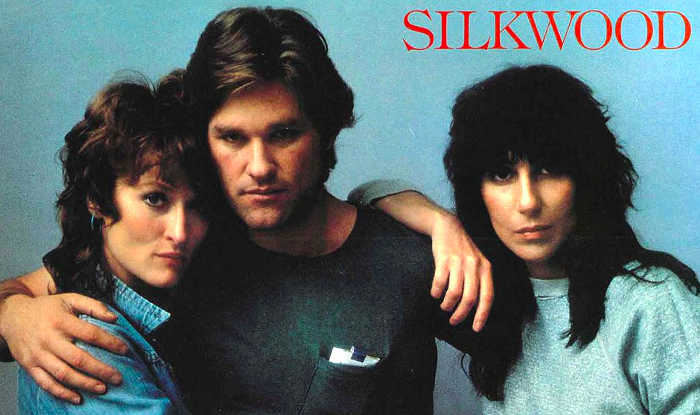 This is a place for legends only.All roads lead to Cher.
This is a place for legends only.All roads lead to Cher.
Her second major drama role after Come Back to the Five and Dime, Jimmy Dean, Jimmy Dean the year prior, Cher won accolades and an Oscar nomination for Silkwood. As Dolly Pelliker, Cher brought humanity, warmth and vulnerability to Mike Nichols’ whistleblower drama. On the surface, she reads as the template for the lovesick, sad lesbian lusting after her best friend. However, in stretching herself for the role, Cher brings added dimension to what could’ve been a thin side character...
Silkwood tells the true story of Karen Silkwood, an employee at the Kerr-McGee Cimarron Fuel Fabrication Site. A gregarious presence at the factory, Karen starts to piece together pieces of information around plutonium contamination that concern her. When the plant tries to oust the union, Karen snaps into action, discovering greater corruption and contamination than she could’ve expected. Her work life bleeds into her personal life, not just because she lives with fellow plant employees Drew (Kurt Russell) and Dolly (Cher).
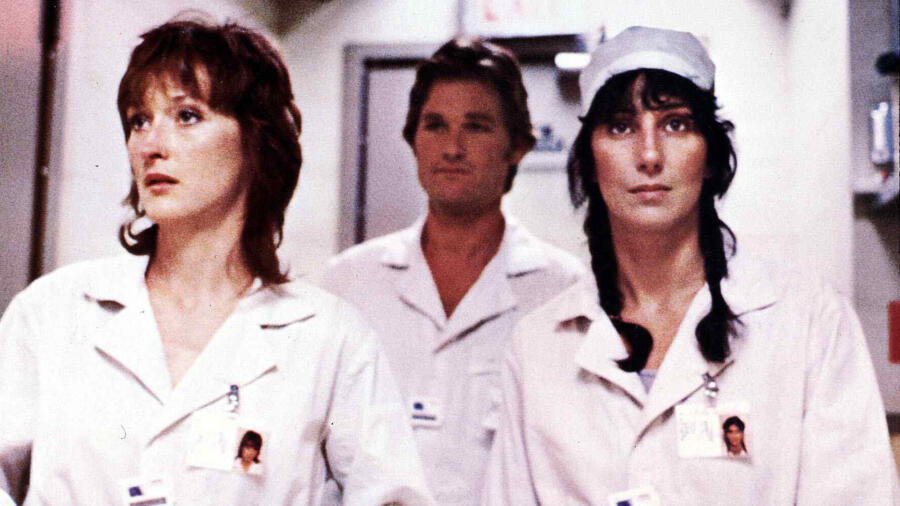 Give me a workplace television drama starring these three.Silkwood is more of a workplace, Altman-esque drama than it is a thriller (like A China Syndrome) or barn-burning inspirational tale (like Norma Rae). Mike Nichols expertly builds out the dynamics of all of the plant workers, from their individual stories to their shared watercooler talks. There’s something oddly prescient of watching people in hazmat suits gather in a corner to celebrate a birthday. They’re able to put out of their minds their highly dangerous jobs for a smoke break and some light conversation. If one half of the movie is about the plant, the other half is about Karen Silkwood’s home life. The combustible trio of Karen, Drew and Dolly feels incredibly lived in and well observed. While the script gives each of the characters strong motivations that bind them together, it also dramatizes the mundane conversations of being partners and roommates. So much of our scenes at home involve talking about spaghetti in the fridge or household chores. We believe their unconventional dynamic because we recognize the universality of the mundane. These aren’t larger than life characters, these are people who have to argue about cleaning and bills.
Give me a workplace television drama starring these three.Silkwood is more of a workplace, Altman-esque drama than it is a thriller (like A China Syndrome) or barn-burning inspirational tale (like Norma Rae). Mike Nichols expertly builds out the dynamics of all of the plant workers, from their individual stories to their shared watercooler talks. There’s something oddly prescient of watching people in hazmat suits gather in a corner to celebrate a birthday. They’re able to put out of their minds their highly dangerous jobs for a smoke break and some light conversation. If one half of the movie is about the plant, the other half is about Karen Silkwood’s home life. The combustible trio of Karen, Drew and Dolly feels incredibly lived in and well observed. While the script gives each of the characters strong motivations that bind them together, it also dramatizes the mundane conversations of being partners and roommates. So much of our scenes at home involve talking about spaghetti in the fridge or household chores. We believe their unconventional dynamic because we recognize the universality of the mundane. These aren’t larger than life characters, these are people who have to argue about cleaning and bills.
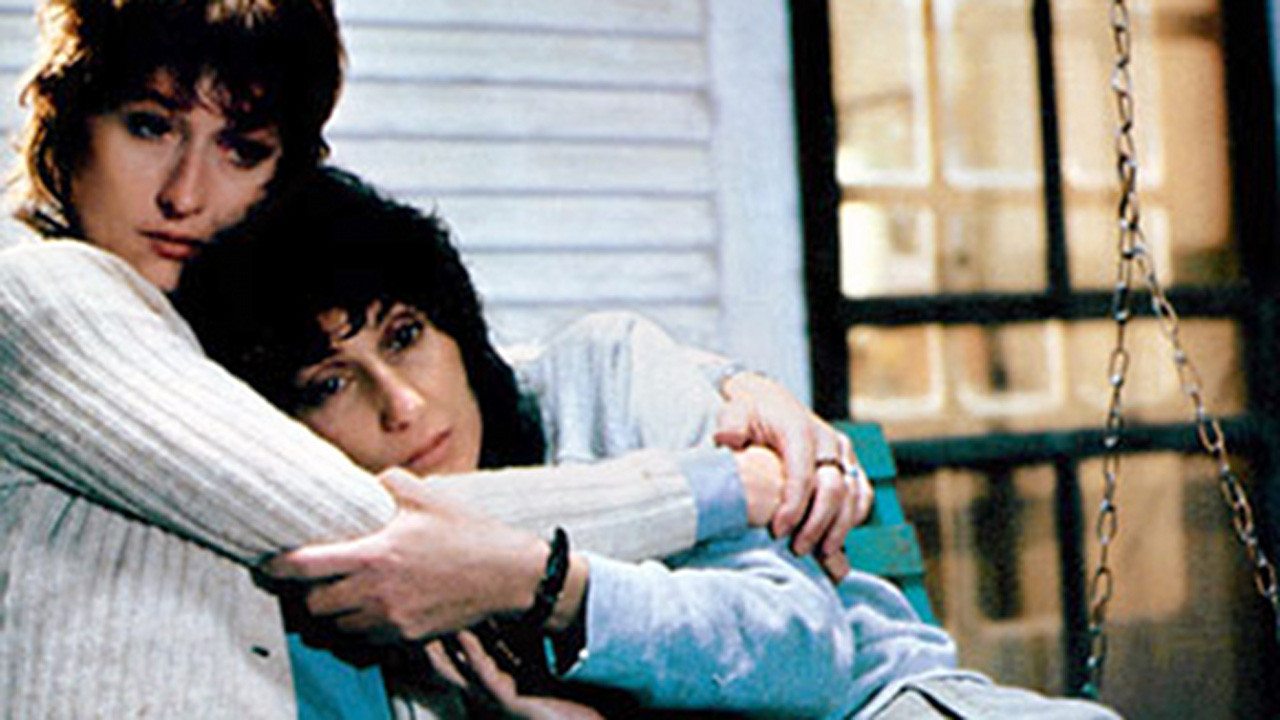 What I would give to have Meryl hold me like this.
What I would give to have Meryl hold me like this.
Cher’s performance as Dolly exists symbiotically with Meryl Streep’s performance as Karen, which ranks among the best of her career. In many of their scenes together, Dolly and Karen are at each other’s throats a bit. However, their relationship is always believable because Cher and Streep were able to carry their real-life friendship into the film.
A recent Vanity Fair profile of the two mentioned a People interview from 1983 where Cher talked about working with Meryl Streep in Silkwood.
“I thought it was going to be like having an audience with the Pope,” she [Cher]. It was anything but. “The first day on location, Meryl just came up, threw her arms around me, and said, ‘I’m so glad you’re here.’ She’s all communication and warmth and friendship, with a great sense of humor.”
Few would have expected superstar Cher to take the role of a meek lesbian janitor in Oklahoma. In so many ways, Dolly Pelliker was everything Cher wasn’t. Cher was a superstar personality with hit singles and a background in variety shows. Her personality and persona were larger than life. Dolly recedes into every room she’s in. She’s the emotional support third wheel when Karen and Drew drive to Texas to visit Karen’s kids. As an out lesbian in rural Oklahoma, she’s often talked about, but not talked to. While Karen hob knobs with everyone at the plant, Dolly silently cleans up everyone’s trash. What Cher was able to tap into about Dolly was her intense discomfort. Acting in a drama alongside the reigning Best Actress winner, Meryl Streep, is intimidating, especially for someone who didn’t have a dramatic background. Cher was able to take this “fish out of water” feeling and mine it for use in the film. Similarly, Meryl Streep became Cher’s acting coach and guardian angel on the set. Just as Karen was protective of Dolly, Meryl was protective of Cher. This authenticity read on screen.
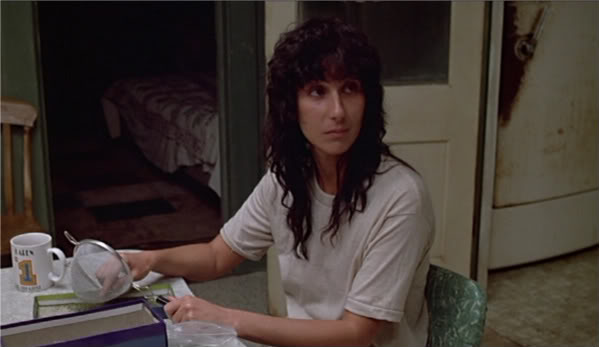 Cher manages to make Dolly somewhat uncomfortable in her own skin by removing her traditional makeup and larger than life persona.
Cher manages to make Dolly somewhat uncomfortable in her own skin by removing her traditional makeup and larger than life persona.
About some things, Nichols was unbending. He told Cher that he didn’t want her character to wear makeup. She was so nervous, she wept - “I am so convincingly ugly,” she said. “I tried to get away with so many things… Mike would give me the white glove test. He’d run his finger across my cheek. Once I tried to cheat and curled my eyelashes and Mike said, ‘Don’t do it again, my dear.’ He said it sweetly, but I got the message.” - “Mike Nichols: A Life” by Mark Harris
Actresses forgoing makeup has long become a tried and true Oscar campaign narrative, used to show how an actress can “deglam” for art. Most recently, Annette Bening used this tactic to prove her commitment for her role as Nic in The Kids are All Right, also a lesbian. It’s reductive to only look at Cher’s role through the lens of “a pop star deglaming.” Part of Nichols’ ask for Cher to not wear makeup is so that she couldn’t hide behind anything. There’s a nakedness to Dolly’s face that is important for the performance. She wears her feelings and longing on her face everyday, trying not to attract attention.
While gay best friends are often one-dimensional quip machines, lesbian best friends are often sad, lovelorn spinsters. Dolly is an early example of this, though Nora Ephron and Alice Arlen’s script allows her more depth. One of Cher’s best early scenes comes the morning after an argument with Karen. Dolly is looking out of a window when Karen approaches her in a white robe. Dolly twirls Karen’s robe in her hand while she tells Karen that she loves her. Karen returns the favor, but Dolly’s face doesn’t light up. Even though Karen is saying the same words that Dolly is saying, she doesn’t mean them in the same way. Cher knows how to subtly convey the little disappointments in each day that come from unreciprocated love.
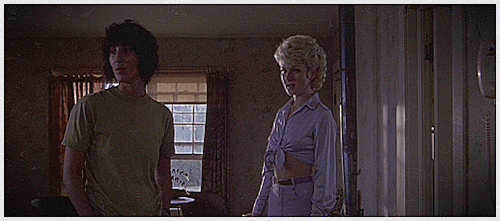
Drew Stephens: Make enough noise there, Dolly?
Dolly Pelliker: You two ain't exactly a silent movie yourselves.
This could be one note that gets played over and over throughout the movie. Yet, Silkwood and Cher don’t let Dolly just sulk. She brings Angela (Diana Scarwid), a local mortician, home for a night of very loud sex, making sure Karen hears it. While Karen and Drew accept Dolly’s sexuality, there does seem to be the subtext of hostility towards Angela specifically. Her queerness was theoretical beforehand, but Angela makes it tangible. In one moment, Angela is doing Dolly’s makeup in the kitchen when Drew walks in and starts making fun of her. Kurt Russell does a great job making Drew charismatic and volatile in equal measures (isn’t the confederate flag in the bedroom a warning sign). While Dolly had a strong, joking relationship with him in the past, Angela definitely gets more on edge around him. His jokes ruffled her feathers, she doesn’t know if he’s friend or foe.
As the movie goes on, both Karen and Dolly find themselves alone in the house. Drew has left after getting frustrated with Karen’s union activities. Angela went back to her husband, leaving Dolly alone. With no one else to take their frustration out on, they fight with each other. Karen knows that Dolly has harbored feelings for her and has used it to her advantage throughout the movie. Dolly is the sad dog that will always be by Karen’s side no matter how Karen treats her. However, kicking her while she is down causes Dolly to snap a bit. Dolly calls into question Karen’s abilities as a parent. This is Karen’s line. She storms out to the porch, with Dolly following, tail between her legs.
For as authentic as Karen and Dolly’s friendship feels, the power dynamics are ostensibly off. Even as Dolly gets her own sexual life and perspective, her heart and thoughts belong to Karen. While she’s the firebrand hero of the piece, Karen isn’t always the most attentive friend or kindest person. In fact, she takes Dolly’s loyalty for granted.
 Cher provides a final gut-punch.
Cher provides a final gut-punch.
In the end, Karen drives away to her death as Meryl Streep croons “Amazing Grace.” Her body isn’t shown, but her mangled car is. As the car is paraded down main street, the weight of Karen’s death is sold by Dolly’s crushed face. She's crying, but isn't loudly emoting. It’s a sullen, quiet distress. Something has died inside her along with Karen. It’s a powerful, full body flash of grief that Cher beautifully brings to life.
While Karen and Dolly’s friendship wasn’t built to last, Cher and Meryl Streep’s friendship sure was. When Cher won her Oscar for Moonstruck in 1987, fellow nominee Streep was the first to applaud. Cher makes sure to thank her legendary friend during her speech. Even just two years ago, Cher and Streep reunited for the legendary sequel Mamma Mia! Here We Go Again, displaying their friendship on the red carpet. At the end of the day, nothing is gayer or greater than the friendship of these two legendary icons.
Previously in Gay Best Friend
pre stonewall
- Plato (Sal Mineo) in Rebel Without a Cause (1955)
- Sebastian Venable in Suddenly Last Summer (1959)
- Calla Mackie (Estelle Parsons) in Rachel Rachel (1968)
post stonewall
- Erich (Norbert Weisser) in Midnight Express (1978)
- Toddy (Robert Preston) & Squash (Alex Karras) in Victor/Victoria (1982)
- Sammy Gray (Steve Zahn) in Reality Bites (1994)
- Gareth (Simon Callow) and Matthew (John Hannah) in Four Weddings and a Funeral (1994)
- George Downs (Rupert Everett) in My Best Friend’s Wedding (1997)
post Ellen's coming out
- George Hanson (Paul Rudd) in The Object of My Affection (1998)
- Bill Truitt (Martin Donovan) in The Opposite of Sex (1998)
- Robert (Rupert Everett) in The Next Best Thing (2000)
- Patti (Sandra Oh) in Under the Tuscan Sun (2003)
- Nigel (Stanley Tucci) in The Devil Wears Prada (2006)
- Wallace Wells (Kieran Culkin) in Scott Pilgrim vs the World (2010)
post marriage equality ruling